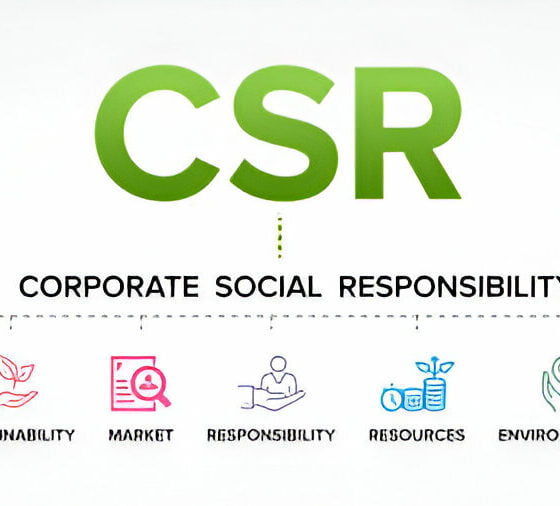

Environment
Corporate Social Responsibility: Nurturing Ethical Leadership and Sustainable Impact
All over the world, corporate social responsibility (CSR) is no longer a buzzword. It has grown as an integral part of the modern business strategy, signifying a company’s commitment to ethical behavior, sustainable development, and positive societal impact. Businesses are continuing to navigate through the maze of the 21st century, while CSR has truly emerged as an eminent lighthouse instructing them toward responsible and ethical leadership. This paper presents the significance of CSR in nurturing ethical leadership and ensuring sustainable impact created.
Understanding Corporate Social Responsibility
Corporate social responsibility can be defined as the practices and policies which are undertaken by corporations for the betterment of the world they live in. These involve environmental management, ethics in labor practices, philanthropy, and even volunteerism. CSR refers to a self-regulating business model put in place to ensure the business is socially accountable to itself, the stakeholders, and the public.
Pillars of CSR
- Environmental Sustainability: Companies are increasingly adapting to green practices so as not to be so harsh on the environment. This may involve a reduction in waste, minimization of carbon emissions, and supporting energy sources that are renewable.
- Ethical Labor Practices: Ensuring that there are fair labor practices is an important issue of CSR. This involves the provision of a hazard-free working environment, fair wages, and respecting workers’ rights.
- Philanthropy: A lot of corporations embark on philanthropy, donating to the needy, supporting community projects, and funding education and research projects.
- Volunteering: When employees are encouraged to give back their time and their skills in service to the society at large, it cultivates a culture of giving and social responsibility.
The Role of CSR in Ethical Leadership
An ethical leader is one who is going to make decisions that will not only be profitable but also beneficial to society. CSR helps describe leadership in the sense that it holds business leaders accountable and makes them feel a sense of moral duty.
Building Trust and Credibility
Truly ethical leaders of any business understand that trust forms the cornerstone of any successful business. Making a commitment to CSR, therefore, builds trust with its various stakeholders. This trust is reinforced by transparent reporting on CSR activities, and honest communication about the challenges as well as the successes.
CSR Helps Leaders Think Long-term
Thinking beyond short-term profits is a calling from CSR to the leaders who run businesses. The sustainable approach prevents the depletion of resources and destruction of communities that could lead to long-term success.
Fostering Positive Corporate Culture
When a company gives a high priority to CSR, it becomes a magnet for like-minded employees and partners because of the very positive corporate culture that it creates. This, in turn, leads to a harmonious and productive working environment.
The Sustainable Impact of CSR
The impact of CSR is much more profound and wide-reaching than within the limits of the company. It sends out ripples of positive change in communities and ecosystems.
Environmental Benefits
Environment conservation is a component that companies that embrace CSR are champions at. These practices reduce pollution, resource use, and help curb climatic changing. This not only benefits the planet better but also their reputation as champions for environmental sustainability.
Social Benefits
CSR programs often deal with social issues. They can go anywhere from education programs to health and poverty alleviation programs. By investment in community development, this improves the living standards of people and offers opportunities for people with lower incomes or who are otherwise disadvantaged. This also fosters social stability and economic growth.
Economic Benefits
While a CSR is an investment in itself, it also translates into economically sound benefits. Companies that practice responsible business conduct increase the loyalty factor in their brands, satisfaction of consumers, and employee retention, ultimately leading to profitability and a competitive edge over other firms.
Case Studies: CSR in Action
Patagonia: Environmental Stewardship
Outdoor clothing company Patagonia is legendary for its environmental practice. The company makes contributions to environmental causes with a fractional part of its profits, uses recycled raw materials in its products, and encourages its customers to repair and recycle gear. Through this, Patagonia has been able to create a pool of completely loyal customers that believe in the brand for environmental stewardship.
TOMS: Social Impact
The branding of the TOMS footwear company is hinged around a positive social impact. The company gives one pair of shoes to a child in need for every pair of shoes sold through its One for One program. This has helped millions of children across the world to put on shoes, thus improving their health and education. The CSR practice by TOMS has created a huge dent in social value but a unique selling proposition for the brand in a very competitive marketplace.
Unilever: Total Approach to CSR
Unilever, being an international company dealing with consumer goods, embeds its CSR philosophy in every operation sector. The company’s Sustainable Living Plan is linked to decoupling of business growth with environmental degradation and social uplift. Unilever is concerned with reducing environmental impacts, advancing the livelihoods of millions along the supply chain, and well-being. The holistic approach has then positioned Unilever as a leading company in practicing sustainable business.
Implementing CSR in Your Business
For businesses looking to implement or enhance their CSR strategies, several steps can guide the process:
- Impact Assessment: Begin with determining the social, environmental, and economic impact associated with your company’s operations. Identify aspects that may need to be improved and possible opportunities for positive change.
- Clear Goal Setting: Develop SMART goals for your CSR initiatives. This clarity will guide your efforts and allow you to monitor and report progress.
- Involving Stakeholders: Engage the efforts and opinions of your employees, customers, suppliers, and the community members in an organization’s CSR activities. Their insights and support are crucial to make your initiatives a reality.
- Make CSR Part of Your Business Strategy: Position CSR as the epicenter of the business strategy and not as an afterthought. Your CSR goals and objectives should therefore be in sync with your mission statement and overall strategies.
- Communicate and Report: Ensure that your CSR activities and progress are transparent to your stakeholders. Periodic reporting will add to the trust that your stakeholders lay on you and reflect your commitment to responsible business practices.
Endnotes
Corporate social responsibility is indeed a powerful tool for inculcating ethical leadership and leaving behind a sustainable impact. It is the pathway wherein companies gain trust, encourage long-term thinking, and create a positive corporate culture. Benefits of CSR do not only get reflected in the surface world but even in the environment, society, and the economy. Emanated from firms like Patagonia, TOMS, and Unilever, this commitment toward CSR resonates with the increased reputation of a firm, attracts loyal customers, and drives sustainable growth in a company. To those businesses destined to thrive in the present world, integration of a CSR approach is not an option, but a realization.


 Environment12 months ago
Environment12 months agoAre Polymer Banknotes: an Eco-Friendly Trend or a Groundswell?

 Features11 months ago
Features11 months agoEco-Friendly Cryptocurrencies: Sustainable Investment Choices

 Features12 months ago
Features12 months agoEco-Friendly Crypto Traders Must Find the Right Exchange

 Energy11 months ago
Energy11 months agoThe Growing Role of Solar Panels in Ireland’s Energy Future



























